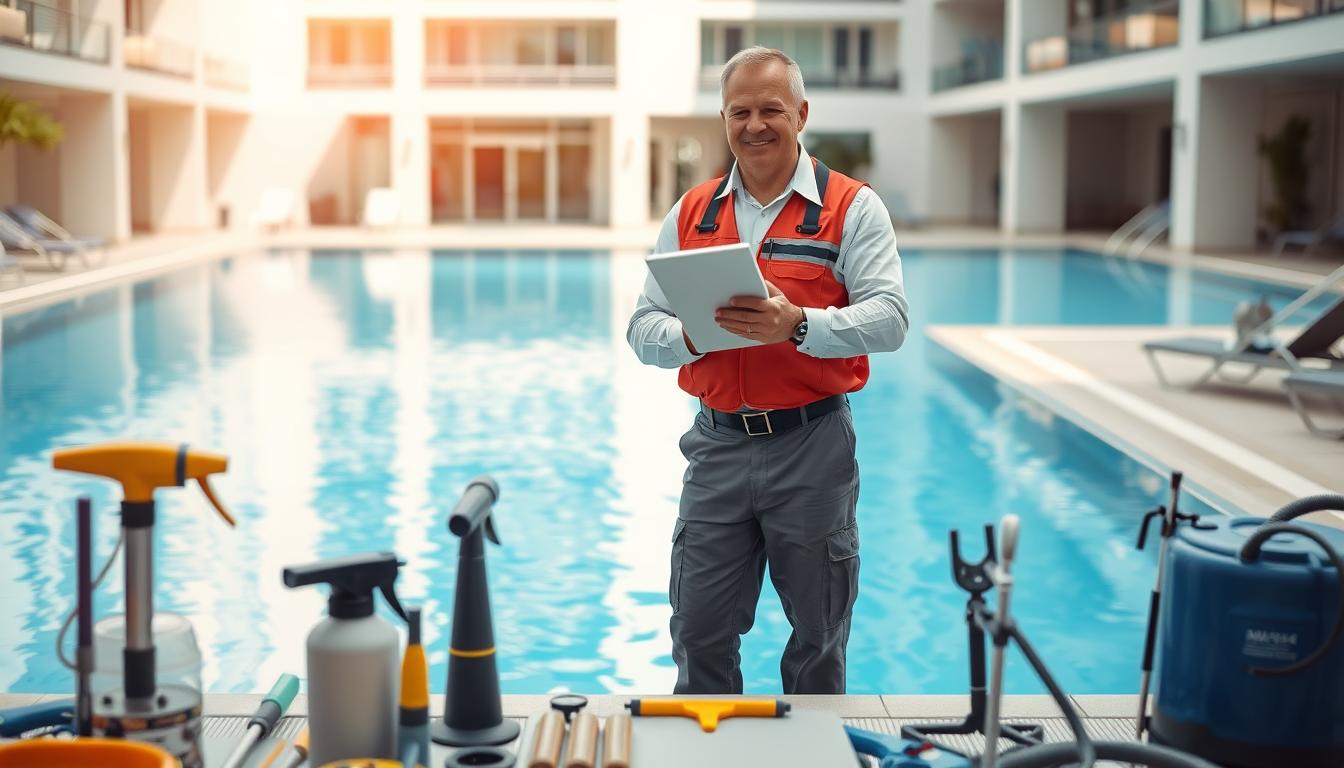In today’s fast-paced world, businesses offering pool access — from fitness centers and hotels to apartment complexes and resorts — know the importance of making a positive first impression. For patrons, a crystal-clear, well-maintained pool isn’t just a luxury — it’s an expectation. What many guests don’t realize, however, is that keeping a pool safe, inviting, and fully operational isn’t a simple task. That responsibility falls on the shoulders of specialized professionals who provide commercial pool service.
Unlike residential pools, commercial pools operate under strict regulations, serve larger numbers of people, and require daily oversight. They are subjected to heavier usage, varying weather conditions, and compliance standards that must be met consistently. Any lapses in maintenance can lead to more than just unhappy guests — they can result in health hazards, fines, or even temporary shutdowns.
In this article, we will break down the essential aspects of commercial pool care, highlight why a tailored service plan is necessary, and explain why hiring expert technicians isn’t just a smart investment — it’s often a legal and operational necessity.
The Unique Demands of Commercial Pool Management
While all pools require maintenance, commercial pools demand a much more rigorous and consistent care plan. The stakes are higher, the equipment is more complex, and the risk of liability is significantly increased.
Let’s explore why maintaining a commercial pool is a whole different undertaking compared to a residential one:
1. Higher Bather Load
The number of swimmers using a commercial pool on any given day can be several times greater than in a residential setting. This higher usage introduces more contaminants into the water — body oils, lotions, hair products, sweat, and bacteria — requiring more frequent monitoring and treatment.
2. Health and Safety Regulations
Public pools are governed by strict health codes, including daily chemical testing, equipment inspections, and cleanliness standards. Failing to meet these regulations can lead to immediate closures, hefty fines, and damage to the facility’s reputation.
3. Increased Wear and Tear
Larger pools mean more equipment, more plumbing, and more exposure to the elements. Without routine care, components like pumps, filters, chlorinators, and heaters can wear out quickly under pressure.
4. Public Perception
In hospitality and recreation industries, guest experience is everything. A pool that is even slightly dirty, smells of chemicals, or has cloudy water will leave a negative impression and reduce customer retention.
This is where the value of a specialized commercial pool service becomes clear — offering expert attention, advanced tools, and compliance-focused procedures to meet the unique challenges of large-scale pool operations.
What’s Included in Commercial Pool Service?
A comprehensive commercial pool service goes far beyond basic cleaning. It includes a wide range of technical, chemical, and preventative maintenance measures, many of which are conducted daily or several times a week, depending on pool usage and local regulations.
Here’s what’s typically involved in a professional commercial pool maintenance program:
Water Chemistry Testing and Balancing
Regular water testing is critical for bather safety. Professionals test and adjust pH, chlorine levels, total alkalinity, calcium hardness, and cyanuric acid levels to ensure optimal water balance. Some facilities may require logs to be maintained for inspection.
Surface Cleaning and Skimming
Keeping the water free of debris is essential, especially in outdoor pools exposed to leaves, insects, and other airborne contaminants. Skimming, vacuuming, and brushing are done frequently.
Filtration System Maintenance
The filtration system is the backbone of pool hygiene. Filters must be cleaned, backwashed, and inspected regularly to keep the water circulating properly and prevent buildup.
Pump and Equipment Inspections
Commercial systems often include high-capacity pumps, automatic feeders, UV sanitation systems, and more. Regular inspections and preventive maintenance ensure these components remain operational and efficient.
Algae and Contaminant Control
Algae can spread quickly in a heavily used pool. Services may include shock treatments, algaecide applications, or specialized cleaning when needed to prevent growth.
Tile and Grout Maintenance
Pool tiles and grout lines can become discolored or accumulate biofilm over time. Routine cleaning keeps the surface areas hygienic and visually appealing.
Documentation and Reporting
Commercial pool operators are often required to maintain records for health departments. A quality commercial pool service includes detailed documentation of maintenance tasks, chemical readings, and compliance checks.
Compliance and Legal Considerations
One of the most important reasons for hiring professionals is ensuring that your facility remains compliant with all relevant laws and safety codes. Pool health regulations can vary depending on state or national guidelines but typically cover:
- Sanitation levels
- Drain safety and anti-entrapment compliance
- Chemical storage and handling
- ADA accessibility features
- Required signage
- Emergency equipment (life rings, safety poles, etc.)
Failure to follow these rules can result in lawsuits, fines, or pool closures — all of which damage a business’s credibility and bottom line.
A certified commercial pool service helps protect your business from liability by ensuring that all operations meet the latest safety codes and inspection standards.
Benefits of Hiring a Commercial Pool Maintenance Provider
Even if your staff includes a general maintenance crew, outsourcing pool care to specialists offers significant advantages. Here’s why hiring a professional team is a wise decision:
1. Expert Knowledge
Trained technicians understand the complexities of pool chemistry, water circulation, and mechanical systems. They bring experience that helps identify and solve problems early — before they become expensive or dangerous.
2. Regulatory Compliance
Commercial pool professionals stay up to date with the latest codes and laws, ensuring that your pool is always compliant and ready for inspections.
3. Time and Resource Efficiency
Letting in-house staff handle pool care might seem cost-effective, but it often leads to inconsistent service. Outsourcing guarantees regular, high-quality maintenance that frees up your team to focus on core operations.
4. Extended Equipment Life
Preventive maintenance reduces wear and tear, extends the life of pumps and filters, and minimizes costly repairs. This long-term view saves money and downtime.
5. Crisis Management
If something goes wrong — a chemical imbalance, pump failure, or contamination event — a trusted service provider can respond quickly and professionally to resolve the issue.
Investing in commercial pool service is not just about clean water — it’s about protecting your guests, your staff, and your reputation.
Tailored Service Plans: One Size Does Not Fit All
Every commercial pool has its own set of challenges. A hotel pool used by families during the day will have different needs than a fitness center pool used for early morning laps or a swim school filled with children. Therefore, a customized maintenance plan is key.
Professional providers assess several factors when designing your service plan:
- Pool size and depth
- Usage frequency and user type
- Indoor vs. outdoor exposure
- Type of sanitation system (chlorine, saltwater, ozone, UV, etc.)
- Local climate and environmental factors
This customized approach ensures that your pool gets the exact care it needs, without overpaying for unnecessary services or cutting corners on essential ones.
The Role of Technology in Modern Pool Maintenance
Commercial pool care has evolved significantly thanks to technology. Advanced monitoring systems, automated feeders, and remote sensors now allow service teams to track chemical levels, water temperature, and system status in real time.
Many modern commercial pool service providers offer:
- Digital water testing and logging
- Remote system diagnostics
- Automated alert systems for anomalies
- Mobile reporting for compliance records
These innovations provide more accurate, responsive, and reliable service — improving safety while reducing manual errors.
Choosing the Right Commercial Pool Service Partner
Not all service providers are created equal. When selecting a commercial maintenance team, look for:
- Experience with commercial-scale systems
- Licensing and insurance
- Certified technicians (CPO, NSPF, etc.)
- Flexible service options and emergency response availability
- Clear pricing and communication
A strong partnership is built on trust, transparency, and a proven track record of success. Don’t just look for a vendor — look for a long-term ally in maintaining your facility’s excellence.
Final Thoughts
Maintaining a commercial pool is no small feat. It demands expertise, consistency, compliance, and a deep understanding of water chemistry and mechanical systems. For business owners and facility managers, the stakes couldn’t be higher: health, safety, customer satisfaction, and regulatory compliance are all on the line.
Hiring a professional commercial pool service is the most effective way to keep your pool clean, safe, and operational — without draining internal resources or risking costly mistakes. It’s not a luxury; it’s a necessity for any organization that takes its guests’ experience and well-being seriously.
By choosing the right provider and investing in routine maintenance, you can ensure your pool remains a valuable asset — not a liability. Clean water, satisfied guests, and peace of mind are all within reach when you make pool care a top priority.





























